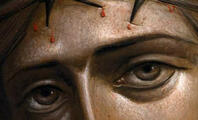who is god?
the one who is who he is.the christian god defines itself as such.<<a god>> is in general a deity; in christianity, the supreme, divine being, all knowing, all powerful and everpresent creator of reality itself and everything within it.'god' is also the working title of this monotheistic divinity.📖: god is the beginning and the end of all things. it can be known with certainty, by the innate human capacity for reason.
the nature of god

one god in three persons: The Father, The Son & The Holy Spirit.
The names of God
the god of christianity is the same as the god of the semitic faiths, namely judaism and islam.judaic tradition has in large part, preserved the <<Fear of God>> as a mean of devotion, hence uttering its name in vain was (and is still considered) a grave sin.to prevent such happenstance, synonyms, adjectives and titles have been applied.this has been preserved in catholicism as well.throughout the text, different designations are used to refer to god. these function as synonyms and are applied in accordance to the context.
(some of the names of god)
♰ YHWH (יהוה) - 'the Lord'
♰ Adonay (אֲדֹנָי) - 'my lord'
♰ 'El (אֵל) - 'god'
♰ Elohim - ' a god'
♰ El Shadday - 'Supreme God'
📖: quote from the catechism;
The Old Testament,
is also known as <the pentateuch>, <the five books of moses> or <the torah> in judaism.📖: these books do not account for literal historical events and the authorship is contested in many cases. it's attributed to the heroes of the peoples where these stories originated. it's a mythologised simplification of history of various semitic peoples, mainly the 12 tribes of judah.
the order in which they appear is not chronological.the pentateuch is the result of four literary traditions:🪦 yahwist (J): authors who called the aforementioned god by its name, 'yahweh'🪦 elohist (E): authors who called the aforementioned god by its title, 'elohim', a general designation for a god, a divine entity🪦 sacerdotal/priestly (P): from the oral and scholastic traditions passed down by clergicals🪦 deuteronomist (D): from the dictated law of moses, in the book of deuteronomyits canon, as we know today, gained its complete form around V b.C.
its canon:
📕 the book of genesis
📕 the book of exodus
📕 the book of leviticus
📕 the book of numbers
📕 the book of deuteronomy

(currently reading)
